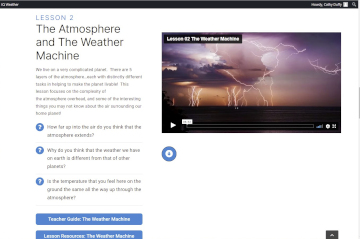IQ Weather is an online course with 20 lessons and eight experiments. Each lesson includes a video, a teacher guide, a lesson plan, and an online quiz. You can see how lessons align with the Next Generation Science Standards in the teacher guide for each lesson. The course should be best for students in grades four through eight.
The lessons cover topics such as weather, climate, the atmosphere, seasons, clouds, oceans, tornadoes, radar, weather technology, weather forecasting, and solar and space weather.
Professionally produced videos teach the lessons. They use lots of film footage and images with voice-over explanations. You can check out the excellent quality by viewing samples on the website. The videos average about five minutes each, but the shortest is only about two and half minutes and the longest is just over eight minutes.
The lesson with the longest video is an interview with storm chasers, complete with footage from their work. A bonus lesson included with Lesson 16 on aviation weather is an interview with a pilot who explains weather from the pilot’s perspective. The real-life perspectives in these and other lessons, make the course especially interesting.
The teacher guide for each lesson provides the teacher with the main points and sometimes includes teaching tips. The separate lesson plan for each lesson lists discussion questions and topics to cover with students both before and after they watch the video. The lesson plan also has vocabulary words with their definitions, plus links to additional reading material and resources that are optional. The additional reading material and resources generally direct you to useful sites, but it’s up to you to figure out how to use those resources. While the videos provide the substance of each lesson, the teacher-led discussions before and after are essential.
Each lesson has an online quiz that is scored by the program. Printable PDFs have the quiz questions and answer keys as well for teacher reference. The program does not track student results, so you need to record quiz scores immediately if you want to keep them.
Experiments
There are eight experiments that are designed to accompany particular lessons, although they don’t need to be completed on the same day the rest of the lesson is presented. For example, students create a cloud in a bottle to supplement Lesson Nine on storms. The experiment is presented on a video or on both a video and PDF instructions for the teacher. A list of the resources you need is on the website.
The first four experiments require simple resources and are relatively easy to do, while the last four require some specialized items and are more challenging. For example, two experiments use liquid nitrogen which can be dangerous to work with. In an experiment on atmospheric pressure, liquid nitrogen is used to explode a plastic bottle. The last four experiments include cautions and specific instructions to make sure you can do them safely.
Summary
IQ Weather serves as a supplement rather than a complete course. This would be a great resource for doing a unit study on weather, perhaps as part of an earth and space science course. The course certainly makes the topic of weather much more interesting than I expected.









